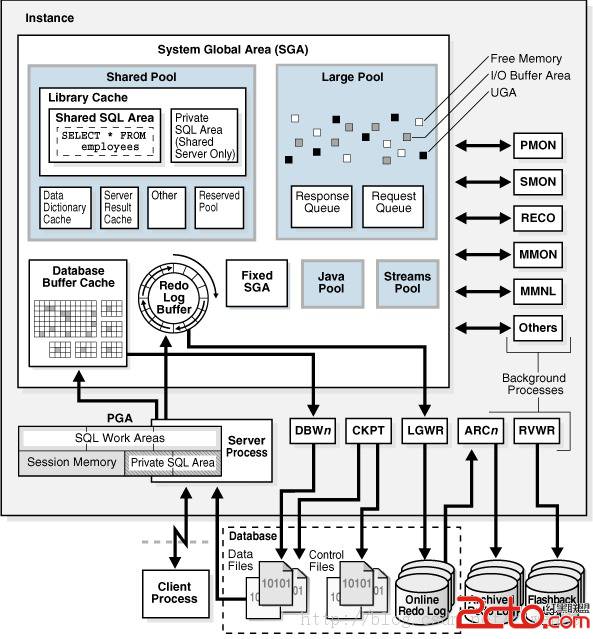[Oracle]-[索引][HINT][执行计划]-带HINT的索引执行计划
举例:
create table t(id int);
create index t_idx on t(id);
SQL> select /*+ index(t t_idx) */ count(*) from t;
Execution Plan
----------------------------------------------------------
Plan hash value: 4075463224
-------------------------------------------------------------------
| Id | Operation | Name | Rows | Cost (%CPU)| Time |
-------------------------------------------------------------------
| 0 | SELECT STATEMENT | | 1 | 2 (0)| 00:00:01 |
| 1 | SORT AGGREGATE | | 1 | | |
| 2 | TABLE ACCESS FULL| T | 3 | 2 (0)| 00:00:01 |
-------------------------------------------------------------------
Note
-----
- dynamic sampling used for this statement
这里忽略了HINT,解释是:因为我们要对表的记录求总数,我们创建的索引并没有指定索引字段T不能为空,所以如果CBO选择在索引上做COUNT,当索引字段上有空值时,COUNT的结果必然不准确。
SQL> select /*+ index(t, t_idx) */ count(id) from t;
Execution Plan
----------------------------------------------------------
Plan hash value: 4235589928
----------------------------------------------------------------------------
| Id | Operation | Name | Rows | Bytes | Cost (%CPU)| Time |
----------------------------------------------------------------------------
| 0 | SELECT STATEMENT | | 1 | 13 | 1 (0)| 00:00:01 |
| 1 | SORT AGGREGATE | | 1 | 13 | | |
| 2 | INDEX FULL SCAN| T_IDX | 3 | 39 | 1 (0)| 00:00:01 |
----------------------------------------------------------------------------
Note
-----
- dynamic sampling used for this statement
这里用到了HINT,解释是:因为我们只是对X字段做COUNT,id字段是索引字段,这个动作相当于COUNT索引上的所有id的键值,这个结果和对表上id字段做COUNT是一样的。
这点我觉得不是很准确。
如果是唯一性索引,则count(*)==count(索引字段)。
如果不是非唯一索引,则列中NULL值不会存入索引,因此count(*)>=count(索引字段)。
再做个实验:
CREATE TABLE TBL_SMALL
(ID NUMBER,
NAME VARCHAR2(5)
);
SQL> create index t_s_idx on tbl_small(id);
create table tbl_big as select rownum id, object_name name from dba_objects where rownum<1000;
SQL> create index t_b_idx on tbl_big(id);
insert into tbl_big values('', '');
>>>>>>>>>>>>>>>>>>>>>>>>>>>>>>>>>>>>>>>>>>>>>>>>>>>>>>>>>>>>>>>>>>>>>>>>>>>>>>>>>>>>>>>>>>>>>>>>>>>
SQL> select * from tbl_small;
ID NAME
---------- -----
2 b
1 a
SQL> select count(*) from tbl_small;
COUNT(*)
----------
3
SQL> select count(id) from tbl_small;
COUNT(ID)
----------
2
SQL> select count(*) from tbl_big;
COUNT(*)
----------
1000
SQL> select count(id) from tbl_big;
COUNT(ID)
----------
999
SQL> set autot trace exp
>>>>>>>>>>>>>>>>>>>>>>>>>>>>>>>>>>>>>>>>>>>>>>>>>>>>>>>>>>>>>>>>>>>>>>>>>>>>>>>>>>>>>>>>>>>>>>>>>>>
TBL_SMALL表:
SQL> select count(*) from tbl_small;
Execution Plan
----------------------------------------------------------
Plan hash value: 1452584873
------------------------------------------------------------------------
| Id | Operation | Name | Rows | Cost (%CPU)| Time |
------------------------------------------------------------------------
| 0 | SELECT STATEMENT | | 1 | 2 (0)| 00:00:01 |
| 1 | SORT AGGREGATE | | 1 | | |
| 2 | TABLE ACCESS FULL| TBL_SMALL | 3 | 2 (0)| 00:00:01 |
------------------------------------------------------------------------
Note
-----
- dynamic sampling used for this statement
SQL> select count(id) from tbl_small;
Execution Plan
----------------------------------------------------------
Plan hash value: 1539159417
----------------------------------------------------------------------------
| Id | Operation | Name | Rows | Bytes | Cost (%CPU)| Time |
----------------------------------------------------------------------------
| 0 | SELECT STATEMENT | | 1 | 13 | 1 (0)| 00:00:01 |
| 1 | SORT AGGREGATE | | 1 | 13 | | |
| 2 | INDEX FULL SCAN| T_S_IDX | 3 | 39 | 1 (0)| 00:00:01 |
----------------------------------------------------------------------------
Note
-----
- dynamic sampling used for this statement
SQL> select /*+ index(tbl_small, t_s_idx) */ count(*) from tbl_small;
Execution Plan
----------------------------------------------------------
Plan hash value: 1452584873<





